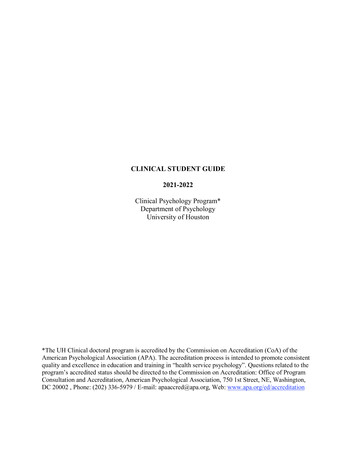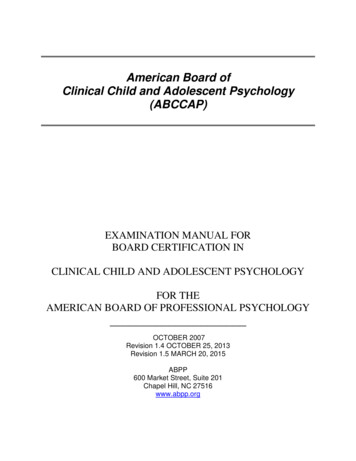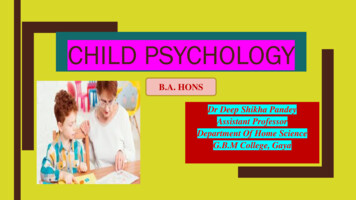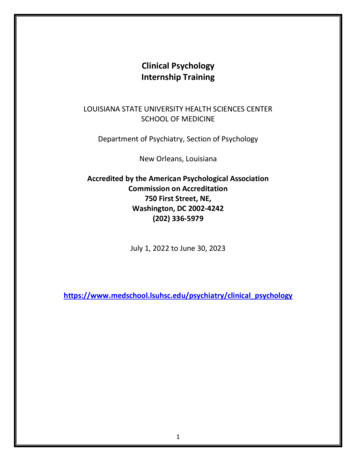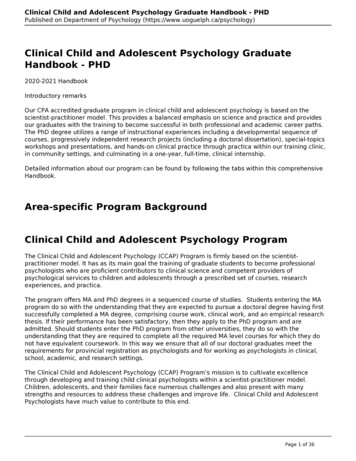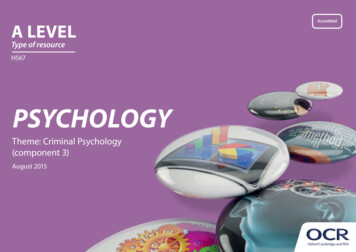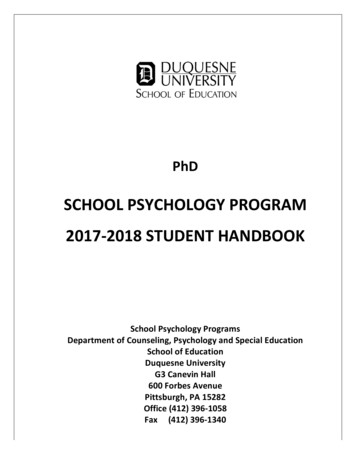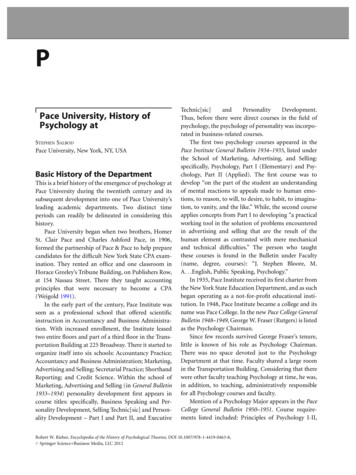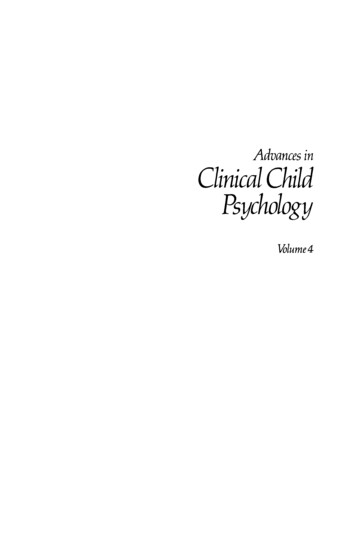
Transcription
Aduances inClinical ChiPsychologldyVolume 4
ADVANCES IN CLINICAL CHILD PSYCHOLOGYAdvisory Editors:DONNA M. GELFAND, University of UtahJOHN C. MASTERS, University of MinnesotaTODD R. RISLEY, University of KansasDAVID L. ROSENHAN, Stanford UniversityALAN O. ROSS, State University of New York at Stony BrookA Continuation Order Plan is available for this series. A continuation order will bringdelivery of each new volume immediately upon publication. Volumes are billed only uponactual shipment. For further information please contact the publisher.
Advances inClinical ChildPsychologyVolume 4Edited byBenjamin B. LaheyUniversity of GeorgiaAthens, GeorgiaandAlan E. KazdinWestern Psychiatric Institute and ClinicUniversity of Pittsburgh School of MedicinePittsburgh, PennsylvaniaPlenum Press· New York and London
The Library of Congress cataloged the first volume of this title as follows:Advances in clinical child psychology. v. 1New York, Plenum Press, c1977v. ill. 24 cm.Key title: Advances in clinical child psychology. ISSN 0149-47321. Clinical psychology-Collected works. 2. Child psychology-Collected works.3. Child psychotherapy-Collected works.618.9'28'977-643411RJ503.3.A37Library of Congress Catalog Card Number 77-643411ISBN-13: 978-1-4613-9810-3e-ISBN-13: 978-1-4613-9808-0DOl: 10.1 007/978-1-4613-9808-0 1981 Plenum Press, New YorkSoftcover reprint of the hardcover 1st edition 1981A Division of Pienum Publishing Corporation233 Spring Street, New York, N.Y. 10013All rights reservedNo part of this book may be reproduced, stored in a retrieval system, or transmitted,in any form or by any means, electronic, mechanical, photocopying, microfilming,recording, or otherwise, without written permission from the Publisher
This series is dedicated tothe children of the world, especiallyMEGAN, EDWARD, ERIN, NICOLE, and MICHELLE
Con tributorsJon S. BaileyDepartment of Psychology, Florida StateUniversity, Tallahassee, FloridaR. Christopher BardenDepartment of Psychology, Southern Methodist University, Dallas, TexasRand D. CongerDepartment of Sociology, University ofGeorgia, Athens, GeorgiaElyse Schwartz FellemanDepartment of Psychology, Vanderbilt University, Nashville, TennesseeSharon L. FosterDepartment of Psychology, West VirginiaUniversity, Morgantown, West VirginiaJames J. FoxDepartment of Special Education, VanderbiltUniversity, Nashville, TennesseeBrandon F. GreeneDepartment of Psychology, Southern IllinoisUniversity, Carbondale, IllinoisRaymond P. HarrisonDepartment of Psychiatry, Center for Cognitive Therapy, University of Pennsylvania,Philadelphia, PennsylvaniaJohn J. HoranDivision of Counseling and Educational Psychology, Pennsylvania State University,University Park, PennsylvaniaPhilip C. KendallDepartment of Psychology, University ofMinnesota, Minneapolis, MinnesotaKenneth K. KiddDepartment of Human Genetics, Yale University School of Medicine, New Haven,Connecticutvii
viiiCONTRIBUTORSJohn C. MastersDepartment of Psychology, Vanderbilt University, Nashville, TennesseeLarry MichelsonDepartment of Psychiatry, Western Psychiatric Institute and Clinic, University ofPittsburgh, School of Medicine, Pittsburgh,PennsylvaniaDavid L. PaulsDepartment of Human Genetics, Yale University School of Medicine, New Haven,ConnecticutWendy L. RitcheyDepartment of Psychology, West VirginiaUniversity, Morgantown, West VirginiaPhillip S. StrainDepartment of Psychiatry, University ofPittsburgh, School of Medicine, WesternPsychiatric Institute and Clinic, Pittsburgh,PennsylvaniaWilliam H. YeatonInstitute for Social ResearchlCRUSK, University of Michigan, Ann Arbor, MichiganWilliam YuleDepartment of Psychology, University ofLondon, Institute of Psychiatry, De Crespigny Park, London, England
PrefaceAdvances in Clinical Child Psychology is a serial publication designed toprovide researchers and clinicians with a medium for discussing newand innovative approaches to the problems of children. In this fourthvolume, a group of highly distinguished authors have described advancing knowledge in a number of critical areas of applied child psychology.These include childhood depression, drug abuse, social skills deficits,community-living skills, the genetics of childhood behavior disorders,and affective states in children. In addition, major statements on newapproaches to the assessment of dysfunctional family systems and thesocial skills of children, as well as the increasingly important methodology of epidemiology, are included in this volume. These chapters provide a synopsis of many of the most important advances in the field ofclinical child psychology.The quality of a series of this sort is, of course, due to the quality ofthe contributing authors. We feel very fortunate indeed, therefore, tohave been able to entice such a distinguished group of authors to contribute to this volume. We are also most appreciative of the guidanceand assistance of the consulting editors who provided us with ideas forchapter topics and authors and who carefully reviewed and edited eachchapter. We also express our hearty thanks to Leonard R. Pace ofPlenum whose expertise and support has always been generously given.BENJAMIN B. LAHEYALANE.KAZDINix
ContentsThe Epidemiology of Child PsychopathologyWilliam Yule11. Introduction . .1.1. Definition of Epidemiology . .1.2. Incidence and Prevalence . .2. What Is a "Case?" .2.1. A Developmental Perspective .2.2. Situation Specificity .2.3. Defect, Disability, and Handicap .2.4. The Perspective of Significant Others .2.5. One Working Solution .3. Classification and Categorization .3.1. Characteristics of a Good System of Classification .3.2. Development of Systems of Classification. . . . . . . . . . . . .3.3. The World Health Organization's InternationalClassification of Diseases-9 .3.4. Diagnostic and Statistical Manual, Third Edition(DSM-III) .3.5. Critique of ICD-9 and DSM-III .3.6. Multivariate Approaches .4. Results of Epidemiological Studies .4.1. The Isle of Wight Studies .4.2. Studies of Adolescents .4.3. The Inner-London Comparative Study .4.4. Preschool Behavior Problems .5. Prevalence Rates of Clinical Psychiatric Syndromes .5.1. Attention Deficit Disorder with Hyperactivity orHyperkinesis. . . . . . . . . . . . . . . . . . . . . . . . . . . . . . . . . . . . . . .5.2. Conduct Disorders .5.3. Emotional Disorders .5.4. Other Disorders .5.5. Eating Disorders . . . . . . . . . . . . . . . . . . . . . . . . . . . . . . . . . . . .5.6. Stereotyped Movement Disorders .5.7. Other Disorders with Physical Manifestations xi
CONTENTSxii5.8. Pervasive Development Disorders. . . . . . . . . . . . . . . . . . .5.9. Specific Development Disorders .5.10. Comment .6. Methodological Problems .6.1. Sampling .6.2. Data Gathering .6.3. Correlation and Causality .7. Toward a Psychological Approach to ChildhoodPsychopathology .8. References.Cognitive-Behavioral Interventions withChildrenPhilip C. Kendall454721. Relation to Adult Cognitive-Behavioral Therapy .2. A Definition? .3. Cognitive-Behavioral Strategies for Teaching Self-Control .3.1. Training Tasks .3.2. Verbal Self-Instructions .3.3. Modeling .3.4. Contingencies: Response-Cost, Self-Reward, andEarning Rewards. . . . . . . .3.5. Role-Playing and Self-Evaluation .3.6. Research Evaluations .4. Social Perspective-Taking (Role-Taking) Training .4.1. Research Outcomes .5. Interpersonal Problem-Solving Training .5.1. Research Outcomes .6. Consistencies across Cognitive-Behavioral Interventions withChildren .7. Issues .8. ClOSing Concerns .9. References .Experimental Studies of Affective States inChildrenJohn C. Masters, Elyse Schwartz Felleman, andR. Christopher 848631. Introduction . 912. Theories of Emotion . 91
xiiiCONTENTS3. Procedures for the Experimental Induction of EmotionalCognitive States in Children and Adults . 924. Validation of Experimental Affect Induction Procedures . 955. Experiential Determinants of Affective States . 985.1. Success/Failure . 995.2. Experiences of Nurturance . 1005.3. Reward/Reinforcement and Punishment . 1005.4. Vicarious Experience: The Observation of Emotion inOthers . 1025.5. Summary: Understanding Affect-InducingExperiences . 1026. Behavioral and Cognitive Consequences of Affective States . 1036.1. Generosity . 1036.2. Self-Gratification . 1056.3. Self-Control . 1066.4. Aggression . 1076.5. Spontaneous Coping Responses . 1076.6. Cognitive Processing . 1087. Factors Mediating the Relation between Affectand Behavior . 1108. Experimental Studies of Self-Implemented andExternally-Implemented Cognitive and Behavioral Proceduresto Alter Affective States . 1129. References . 114Social-Skills Assessment of ChildrenLarry Michelson, Sharon L. Foster, andWendy L. Ritchey41. Introduction .2. Definitions of Social Skills .3. Dimensions of Analysis .3.1. Behavior .3.2. Situations .3.3. Subject Characteristics .3.4. Outcome .4. Methods of Assessment .4.1. Role-Play Assessment .4.2. Ratings by Significant Others .4.3. Self-Report Measures .4.4. Naturalistic Observation .5. Conclusions and Future Directions .6. References .119120122122124125126131131135147152157158
xivPeers as Behavior Change Agents forWithdrawn ClassmatesPhillip S. Strain and James J. FoxCONTENTS51. Introduction .2. Behavioral Treatment of PreschoolSocial Withdrawal .3. Peer-Mediated Intervention Strategies .3.1. Prompting and Reinforcement . , .3.2. Peer Social Initiations .3.3. Peer Modeling .3.4. Incidental Peer Influence .3.5. Conclusions .4. Systematic Training of Peers .5. Assessment and Treatment Evaluation .6. Generalization of Treatment Effects .7. References .The Assessment of Dysfunctional FamilySystemsRand D. Conger16716917217217317517718018218518919461. Overview .1.1. Behavioral Assessment .1.2. Systems Analysis .2. Couple Relationships .2.1. The Oregon Studies .2.2. The Illinois and Indiana Studies .2.3. Discussion and Conclusions .3. The Problem Child .3.1. The Oregon Studies .3.2. The Georgia Studies .3.3. The Tennessee Studies .3.4. Discussion and Conclusions .4. The Problem Parent .4.1. The Oregon Studies .4.2. The Pennsylvania Studies .4.3. Discussion and Conclusions .5. Looking to the Future .6. References 37239
xvCONTENTSBehavioral Community Psychology: Strategiesand Tactics for Teaching Community Skills toChildren and AdolescentsWilliam H. Yeaton, Brandon F. Greene, andJon S. Bailey71. Representative Contemporary Research .1.1. Nutrition .1.2. Medical Care .1.3. Safety .1.4. Literacy .1.5. Ecology .1.6. Work Skills .1.7. Developing Relationships .1.8. Leisure and Recreation .1.9. Consumerism .1.10. Summary .2. Choice of Treatment .2.1. Conceptual Relevance of Treatment .2.2. Effectiveness of Treatment .2.3. Utilization of Treatment .3. A Successive-Stage Strategy . , .3.1. Identify and Conceptualize the Problem .3.2. Formulate the Dependent Variables .3.3. Collect Data .3.4. Formulate the Independent Variables .3.5. Disseminate Treatment .4. Summary .4.1. A Dissemination Technology: Two Choices? .5. References .Drug Abuse by Children and Adolescents:Perspectives on Incidence, Etiology,Assessment, and Prevention ProgrammingJohn J. Horan and Raymond P. 26827027127127327427527627727881. The Shifting Priorities of Drug Education .2. Prevalence of the Drug Problem .2.1. Nicotine .2.2. Alcohol .2.3. Marijuana .285286287288289
xvi3.4.5.6.CONTENTS2.4. Hallucinogens . 2892.5. Cocaine . 2892.6. Inhalants . 2892.7. Amphetamines . 2902.8. Sedatives and Tranquilizers . 2902.9. Opioids . 2912.10. Concluding Observations on Usage Data . 291Etiological Factors . 2923.1. Behavior Variables . 2933.2. Classical Decision Theory and Drug Use . 295Assessing the Outcomes of Drug Education: Conceptual andMethodological Issues . 2964.1. Purpose I: Knowledge Gain . 2964.2. Purpose II: Attitude Change . 3004.3. Purpose III: Behavior Change . 303Prevention Programming . 3085.1. Information-Based Programming . 3095.2. Induced Cognitive Dissonance . 3205.3. Behavioral Group Counseling . 3225.4. Future Directions . 323References . 324Genetics of Childhood Behavior DisordersDavid L. Pauls and Kenneth K. Kidd91. Introduction . 3312. Etiologic Heterogeneity: A Possible Complication . 3362.1. Selecting Homogeneous Groups by Inheritance Pattern . 3372.2. Greater Homogeneity through Increased DiagnosticPrecision . 3372.3. Greater Homogeneity through Sample Definition . 3383. Genetic Analyses . 3403.1. Methods . 3403.2. Examples of Genetic Analyses . 3444. Conclusion . 3585. References . 358Index . 363
Advances in clinical child psychology. v. 1-New York, Plenum Press, c1977-v. ill. 24 cm. Key title: Advances in clinical child psychology. ISSN 0149-4732 1. Clinical psychology-Collected works. 2. Child psychology-Collected works. 3. Child psychotherapy-Collected works. RJ503.3.A37 618.9'28'9 77-643411 Library of Congress Catalog Card Number 77 .
